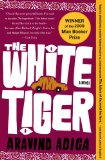Summary | Excerpt | Reading Guide | Reviews | Beyond the Book | Read-Alikes | Genres & Themes | Author Bio

Critics' Opinion:
Readers' Opinion:
First Published:
Apr 2008, 288 pages
Paperback:
Oct 2008, 304 pages
 Book Reviewed by:
Book Reviewed by:
Sarah Sacha Dollacker
Buy This Book
This article relates to The White Tiger
Without his violent act Balram Halwai, the hero of The White Tiger, would have had trouble accessing upward social mobility because of the strict caste system in India. Many Westerners believe, because India is officially a democracy and the Indian constitution of 1949 banned it, that the caste system is a thing of the past, but in many aspects of Indian society, it is alive and well.
There are four castes or varnas:
Below these main castes, and traditionally excluded from larger society, is the group formerly called the Untouchables, now called Dalits (about 160 million/15% of the Indian population). Within each Varna are subgroups call Jati. Balram's last name, Halwai, means sweet maker. He is a member of the sweet maker Jati, within the Shudras caste.
Historically, the castes maintained social and economic order, functioning much like European medieval guilds. The structure was maintained largely through social consent. While the caste system is not explicitly religious, the Hindu religion (about 80% of Indians today are Hindus) has played a significant part in maintaining the structure because Hinduism preaches a cycle of birth and reincarnation. As such, people born into a high cast were presumed to be rewarded for having lived faithfully and dutifully in previous incarnations, while those born into a lower caste could only hope to do better next time.
Today, however, the infusion of democratic principles in the political system of India has put pressure on the caste system. Presumably, fifty years ago, a person like Balram would have never have challenged the caste system like he did when he killed his boss, but modern times, the infusion of democratic ideals and money have contributed to the sense that rising out of one's caste is possible.
Currently, there is much change in India to democratize the caste system, but many aspects of the old ways remain intractable. Inter-caste marriages are becoming more common, for example, but caste remains an important component for many when selecting a spouse. The caste system is still very rigid in the rural areas, the 'Darkness'.
The Indian government has documented castes and subcastes to determine need for education and jobs. This process is called reservation, and it is similar to affirmative action in the U.S. Reservation seems to have merely divided the social system again, this time into backward castes, the groups formally at the bottom who are in need of reservation, and forward castes, those groups formally at the top who are not in need of reservation.
The caste-based reservation policy has led to protests, notably the fiery protest in 2006. Many complain of reverse discrimination towards the forward castes. The modern opinion is that caste-based reservation should be based on economic need rather than caste. Many Dalits, Untouchables, are currently wealthier than many in the forward castes, but they are still eligible for special government assistance due to their social status.
The caste system is believed to have originated when Aryan nomads migrated to India about 1500 BC and, having conquered the local people, pushing many south or north into the mountainous regions, organized society into groups with themselves at the top of the hierarchy. Hinduism dates back even earlier and is unique among world religions in that it does not have a known founder and instead has developed gradually over the past 4000 years.
Filed under Places, Cultures & Identities
![]() This article relates to The White Tiger.
It first ran in the May 2, 2008
issue of BookBrowse Recommends.
This article relates to The White Tiger.
It first ran in the May 2, 2008
issue of BookBrowse Recommends.





The Funeral Cryer by Wenyan Lu
Debut novelist Wenyan Lu brings us this witty yet profound story about one woman's midlife reawakening in contemporary rural China.
Your guide toexceptional books
BookBrowse seeks out and recommends the best in contemporary fiction and nonfiction—books that not only engage and entertain but also deepen our understanding of ourselves and the world around us.